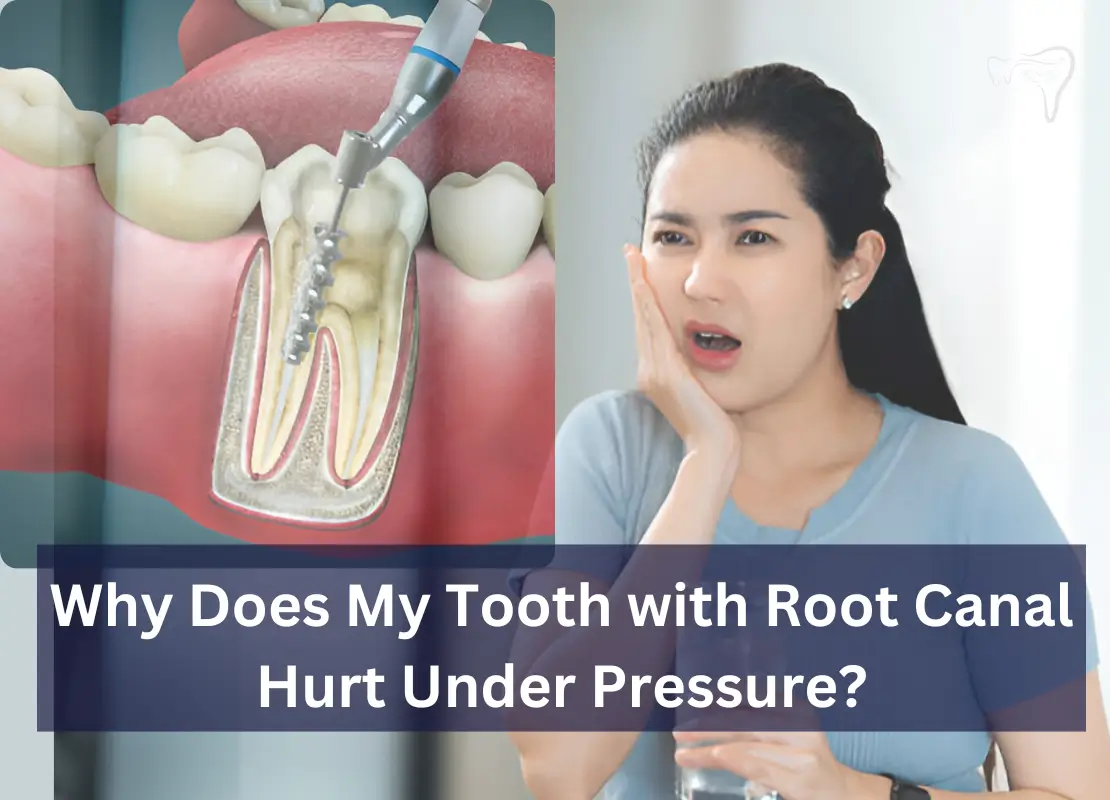A root canal is a common dental procedure designed to preserve teeth functionality when faced with cavities or decay. As a dentist with years of experience, I’ve seen how removing infected pulp or damaged pulp from the tooth interior and inner chamber can save a tooth from extraction.
While advanced techniques and modern technology make this intensive procedure largely painless through anesthesia, some patients may experience sensitivity or discomfort during their healing journey.The process involves deep cleaning of the tooth root, followed by cleaning and sealing to maintain your natural smile.
Though typically successful, occasional pressure or pulsating pain after this invasive surgery might require additional cleaning or treatment. Most patients find relief with over-the-counter pain relievers, managing mild to moderate discomfort as they heal using current dental techniques designed for maximum comfort.
Why Does My Tooth with Root Canal Hurt Under Pressure?(Short Answer)
Is It Normal for a Root Canal Tooth to Hurt? Find Out Now!
Having personally treated numerous cases, I can tell you that experiencing discomfort after a root canal is quite common. The invasive process is meant to eradicate your tooth pain, but the procedure itself can leave some lingering sensitivity. It’s normal to feel tenderness for a few days as your tooth heals from the process.
However, if you’re experiencing severe pain that keeps lasting longer than a week, something likely needs more work. I’ve seen patients worry unnecessarily about mild pressure sensitivity, but I always emphasize the importance of distinguishing between expected healing sensations and problematic symptoms.
Why Is Your Treated Tooth in Pain? The Shocking Truth!
As an endodontist, I see many reasons why a tooth might hurt when you bite down after a root canal. Sometimes it’s referral pain, where your mouth is getting used to the new normal. In such cases, common causes of tooth pain include various factors we regularly monitor:
Your Tooth Has Not Healed Yet
As a dentist, I often see patients whose root canal-treated tooth hurts under pressure – a significant situation that simply needs time to heal. The reasons are simple: your tooth must settle naturally for proper recovery. Strictly following post-op instructions and learning to abide by them ensures faster healing. Just last week, a patient’s anxiety turned to relief once they understood this natural healing process.
The Tooth Underwent Trauma
Through my years in emergency dental care, I’ve seen how oral trauma can make your tooth hurt when you bite down. The pain can stem from various incidents – whether you ate something too hard or took a blow to the face, the lingering pressure sensitivity needs proper attention. Just recently, I treated a hockey player who experienced exactly this scenario, and proper care made all the difference.
Fractured Tooth
In recent cases, I’ve seen how a fractured tooth or broken crown becomes more than just quite painful – it creates an entryway for bacteria to take root. The area treated earlier falls under siege, compromising your tooth’s defense system.
The Crown Was Not Properly Attached
As a dental specialist, I often see how pain can develop from an ill-fitted crown. When not bonded correctly, the crown shifts over time, leading to instability and discomfort. This means even small misalignments can cause bigger issues. Just last week, a patient’s persistent sensitivity was solved by simply adjusting their crown’s fit.
Remaining Infection and Inflammation
Having treated numerous patients with post-root canal sensitivity, I’ve observed that persistent pain often stems from residual bacteria that weren’t completely eliminated during the initial dental procedure. When pressure is applied to the treated area, patients may experience discomfort due to ongoing inflammation in the surrounding tissues.
The challenge lies in the meticulous removal and elimination of all infectious material during the procedural steps. While some degree of lingering sensitivity is normal, spreading infection requires proactive intervention. Through my years of practice, I’ve learned that safeguarding against post-treatment complications involves careful monitoring and curbing any signs of trouble before they impact your recovery.
Nerve Irritation
Through my clinical practice, I’ve observed that post-procedure nerve irritation and sensitivity often follow dental work, especially under pressure. The aftermath typically involves varying levels of discomfort and pain, but proper management is key. If you’re experiencing toothache and ear pain, nerve irritation may be a contributing factor.
We use tailored techniques and strategies backed by professional expertise to identify the nuances, mitigate symptoms, and ensure positive outcomes. My focus remains on guiding patients through a seamless recovery journey.
5 Ways to Manage Tooth Pain When Pressure is Applied After a Root Canal
Let me share effective methods I recommend to my patients for handling post-root canal sensitivity.
- Use two pillows to keep your head elevated while sleeping, as this can help reduce discomfort and pressure around the treated area.
- Regularly rinse your oral cavity with a saltwater solution to keep the area clean and promote healing.
- Do not indulge in spicy foods; opt for soft and bland foods instead. It’s advisable to steer clear of solid foods for at least a week after the treatment.
- Apply a cold compress or ice pack over the affected area to minimize swelling and alleviate discomfort.
- Never miss your prescribed or over-the-counter pain relief medication, as it will help manage the pain effectively during the recovery period.
Complications After a Root Canal
Having treated countless teeth over my career, I’ve seen that while a root canal procedure typically has a high rate of success, some patients may face complications during their recovery journey. The development of abscesses or cysts often signals a failed treatment, usually due to a persistent infection.
As a specialist, I emphasize the importance of prompt dental attention at the first warning signs of discomfort. My experience shows that thorough evaluation and consistent follow-up care are crucial for catching potential issues before they worsen.Never forget that patients die from pulling an infected tooth without proper intervention.
The Role of Dental X-rays in Detecting Oral Health Problems
In my practice, diagnostic x-rays have proven invaluable for post-root canal care. These detailed images help us as dentists examine tooth structures and assess treatment success. Through regular follow-up visits, we can proactively spot potential complications like abscesses or cysts.
This careful monitoring allows for the identification of concerns promptly and effectively, supporting long-term oral health. I’ve seen countless cases where early detection through imaging has made all the difference in treatment outcomes.
Tips for Easing Pain Caused by Pressure
In my years of dental practice, I’ve found that alleviating pressure-related pain starts with proper home care remedies. Good oral hygiene practices, including gentle brushing and careful flossing, are crucial for keeping your teeth and gums healthy.
I recommend incorporating an antiseptic mouthwash into your daily routine to enhance oral health and reduce the risk of complications. Through consistently managing these practices, many of my patients achieve a more pain-free experience. These effective methods help minimize discomfort during recovery.
Proper Oral Hygiene
Drawing from my clinical observations, achieving a pain-free oral experience requires exceptional hygiene practices. I advise my patients to focus on thorough brushing of their teeth twice daily, complemented by regular flossing. Using an antiseptic mouthwash helps combat bacteria and buildup, creating a healthy environment for optimal well-being.
From treating numerous cases, I’ve noticed this routine significantly reduces the likelihood of pressure-related pain. My patients who diligently maintain these practices consistently prevent post-treatment complications.
Over-the-Counter Pain Relief
In my practice, I often recommend over-the-counter pain relief options for managing pressure-related pain. Common medications like ibuprofen or acetaminophen can provide effective temporary relief from post-procedure discomfort.
As a dentist, I always emphasize following the recommended dosage, but if symptoms persist or worsen, don’t hesitate to consult a healthcare professional for additional guidance.
Seeking Expert Guidance
When home care and remedies don’t provide relief, seek professional assistance immediately. Consulting your dentist about pressure-related pain is crucial for your oral health. With their expertise, they can evaluate and pinpoint any underlying issues, then recommend appropriate interventions to address the cause.
Visiting the Dentist for Advice
If you’re experiencing persistent discomfort, scheduling a consultation with your dentist is essential. Having seen numerous cases, I can assure you that a thorough examination, often including X-rays, is crucial. Your dentist will use this personalized approach to identify the root cause of your pressure-related pain. Based on the diagnosis, they’ll develop targeted solutions specifically suited to your oral health needs.
Considering Retreatment or Alternative Interventions
Sometimes, a failed root canal might be causing your discomfort. From my experience with complex cases, retreatment or alternative interventions are often worth considering. Your dentist will discuss all available options, explaining the benefits and potential outcomes of each choice.
I’ve found that taking a collaborative approach helps patients stay actively involved in their oral health journey. This way, you maintain control over the treatment process while making informed decisions with a clear understanding of what lies ahead.
Conclusion
Pain under pressure after a root canal is common during the healing process as the tooth adjusts. However, if pain persists beyond a week or worsens, it may indicate further issues like a fractured tooth or inadequate healing. Timely follow-up and proper care are key to resolving these discomforts.

